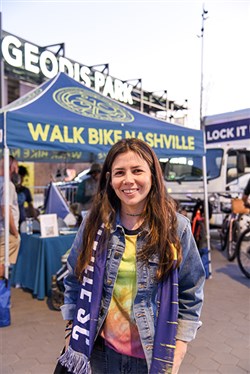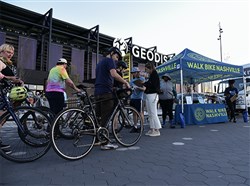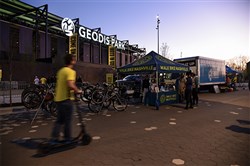VOL. 47 | NO. 14 | Friday, March 31, 2023
Bicyclists finding their lane
By Lucas Hendrickson
Joshua Littlefield might be one of the untold numbers of people who’ve relocated to the Nashville area from California over the past few years, but he’s already picked up on a specific, time-honored Music City tradition.
He cut it close when it came to the start time of an event he was attending.
But Littlefield and his half-dozen bicycle riding friends had planned it that way. They had gathered at Fait La Force Brewing on Third Avenue South for a pregame libation and then pedaled roughly 2 miles to Geodis Park for Saturday’s Nashville SC match against FC Cincinnati.
When they pulled up to the northeast corner of the stadium grounds with 15 minutes till kickoff, they dropped their rides off with the free “bike valet” service offered by cycling/pedestrian advocacy group Walk Bike Nashville, exactly as they’d intended.
“I think we saw the team posting about it early this year,” Littlefield says. “All of last year, we would walk from that brewery, but this has just been like a really cool service that they’re offering, and we love it.”
And as much as it might have made club officials happy to have seven more ticket-holders in the building before the national anthem was sung and fireworks shot into the sky, it made Walk Bike Nashville executive director Meredith Montgomery that much happier.
Seven bicycle riders (not to mention a couple dozen others) used the service her group is piloting for the first eight games of the NSC season, keeping that many more cars from having to circle the Fairgrounds area looking for parking and perhaps being even later to the game.
The process of leaving their bikes (along with a couple of dockless scooter riders moments later) with the valet service could hardly have been simpler: Ride up, leave their name and contact info with a WBN staffer, secure any helmets or safety gear with their bikes and head in to enjoy the match. (Or maybe not so much considering the one-goal loss to NSC’s emerging rivals to the north.)
Montgomery says she’s pleased with the usership of the service three games into the 2023 season, something the group had a vision for when the team opened the stadium midway through the 2022 season.
“I don’t remember who initially started this conversation, but we started talking to NSC last year and kind of went back and forth,” she says. “We couldn’t pull it together before the season started, and then they were kind of, ‘I think we’re good right now, we don’t need it.’
“Then midseason we were kind of reporting on our members being really loud, ‘Hey, there isn’t enough bike parking and, also, when the sidewalk’s gonna come?’ she continues. “Once they could see there really was a need for this, we started talking about doing this again. They agreed that it should be a free service, so they basically contracted us to provide this.”
Giving voice to the need

Walk Bike Nashville executive director Meredith Montgomery.
-- Photo By Ruth Kennedy | The LedgerThe Geodis Park bike valet service is only one of WBN’s public-facing efforts to generate more bike ridership throughout the Midstate, something Montgomery started advocating for years earlier living in Alabama.
“I started becoming an advocate because I started biking my kids to school,” Montgomery says. “And when you do it every day, you realize, ‘Why isn’t this crosswalk painted? Why is there not a curb cut here?’ Just slowly getting familiar with the process of how change happens was fascinating to me.”
Montgomery had been the publisher of a community magazine in Fairhope, Alabama, but relocated to Nashville with a clean slate after shuttering the magazine during the pandemic.
“When I moved here and wasn’t really sure what I wanted to do,” she says, “I started talking to Civic Design Center, and they were like, ‘We don’t have any openings, but Walk Bike Nashville is looking for an E.D.,’ and I looked up to the organization and thought, ‘This is awesome.’”
Montgomery could hardly have picked a more crucial time to sign on with an organization designed to advocate for Nashvillians who ride, walk or use public transit to traverse the city. Metro Nashville Police Department numbers tallied 49 pedestrian deaths in Nashville in 2022, and there’s been a substantial rise in hit-and-run car accidents involving both pedestrians and bicyclists across the city’s growth path during the past 15 years.
While opportunities like the Geodis Park bike valet are useful for WBN’s exposure among recreational riders, Montgomery and her group also are hyper-focused on serving a community that relies on safe biking and walking options as a primary means of transportation.
“For years, we were focused on the needs of the people that were coming to us, our membership base, which are generally people that are walking or biking by choice,” Montgomery says. “Several years ago, the organization realized the people that are being impacted the most as far as the lack of infrastructure, the people that are dying on our streets the most, are the people that are living in vulnerable neighborhoods and they’re the people we aren’t necessarily hearing from.
“The organization intentionally started putting their resources out there to go to the community and meet with people, hear what their needs are, what their experiences are, and try to empower them to also become advocates,” she continues.
“A lot of people that walk and bike because they have to might not have time to think, ‘It’s my right to be able to move through the city safely.’ So kind of giving them the knowledge and the tools to be able to speak up and say what they need is important.”
Changing the car culture

The Geodis Park bicycle valet service, a joint venture between Nashville SC and Walk Bike Nashville, was begun for a simple reason: Bicyclists attending games demanded it.
-- Photo By Ruth Kennedy | The LedgerWalk Bike Nashville’s efforts are a community component of Metro Nashville government’s adoption of Vision Zero, a multinational effort to help create safer roadways overall and eliminate vehicular fatalities of all kinds. Mayor John Cooper’s administration formulated Nashville’s version of the Vision Zero action plan alongside the creation of the city’s dedicated Department of Transportation and Multimodal Infrastructure in 2021.
(A detailed look at Metro’s Vision Zero plans and implementation)
NDOT’s director Diana Alarcon had previous experience in launching Vision Zero plans at previous jobs in Tuscon, Arizona, and Fort Lauderdale, Florida, something Montgomery says gives Alarcon unique perspective in folding community groups like WBN into the conversation about the city’s needs.
“I think it’s been really positive. Director Alarcon started not too long after I started, and she truly believes in multimodal,” Montgomery says. “A Department of Transportation, a lot of times it’s so car-centric, but she legitimately cares about the whole multimodal scope.
“We meet regularly with them. They’re open to hearing from us when we have questions about ‘Why isn’t this being done?’ We’ve got people we can ask and we can get answers, and then they’ve gotten in the good habit of coming to us for community engagement,” she continues. “So we love that we have a seat at the table with a lot of these conversations with NDOT, more and just now kind of getting in with (Tennessee Department of Transportation).
“But we think that the people that should be giving feedback are the people that whatever the project is directly impacts you. We are able to connect them to community members so that they can get really specific feedback on whatever it is that they’re working on.”
But while a specific, data-driven governmental approach to increasing overall transportation infrastructure safety is a noble goal, the broader issue of changing (or even just slowing down) a motor vehicle-dependent culture in a rapidly growing metropolitan area is a much harder nut to crack. Montgomery says her group understands that challenge, which is why advocacy groups and public/private partnerships have to approach it from multiple angles simultaneously.
“The great thing about the Vision Zero approach is it’s a systems approach. There’s not just one fix. So it’s the engineering, the infrastructure, but it’s also the education and the encouragement,” she says. “A big goal of ours is to reduce fatalities, but it’s also to change the culture. We could get to zero fatalities, but it could be because nobody’s walking and biking anyway, right?

The Nashville SC valet service isn’t restricted to bikes, as this scooter rider learned upon arrival.
-- Photo By Ruth Kennedy | The Ledger“So trying to continue to push for more investment in infrastructure so that people feel safer biking, but also really encouraging that culture to get more people out biking,” Montgomery continues. “If there’s more people biking, drivers are gonna be more aware of them. So I think that culture piece is really hard. It’s almost as hard as pushing for the money for the big things to be built.
“We have a horrible culture of hit and runs here. I’ve heard Diana from NDOT say that we’re No. 1 in the country for hit and runs, and, so, for whatever reason, a lot of drivers don’t feel the sense of responsibility when they’re behind the wheel.”
Montgomery points to the dedicated, hardened lanes currently making their way up 12th Avenue South as a massive win for not only that part of the city, but also as a case study for what a connected network of bicycle and pedestrian-specific lanes can mean for the area.
“What’s happening on 12 South is wonderful because it shows what’s possible, and it shows how much people are excited about it,” she says. “I mean, it’s like before anytime a new segment was laid down, like people were using it because they wanted it.
“I would say another win has been the ‘Keep Public Infrastructure Public’ petition in the fall that started with an NDOT policy that was then adopted as a Metro-wide policy where you can no longer block any kind of right of way, bike lane, sidewalk, greenway for more than seven days at a time for, say, a construction project without special permission to do so,” Montgomery continues. “We’ve addressed kind of the long-term issue which is a good start, but now we need to look at these short-term issues where delivery trucks just get in the habit of parking there or valet stands are operating in a bike lane.
“I also think people being able to speak up, and seeing that NDOT is being more responsive, they feel like it’s worth their time. And then that’s also informing the improvements that are happening, because they’re seeing where the priorities are.”
Seeing the community shift
While Walk Bike Nashville has spent a lot of time and resources of late communicating up through governmental channels, the group hasn’t lost sight of the power of reaching out through the recreational riding community to deliver its message, even as the scope of those efforts have pivoted a bit over the past few years.
“Hosting bike rides used to be something WBN offered regularly,” Montgomery says. “Now that there are so many different groups regularly leading community bike rides for all different experience levels, we have shifted to promoting the rides that already exist versus hosting our own. It’s a good sign when there’s no longer a need for some of the programs we’ve offered in the past.”
One huge WBN event looming on the horizon is the group’s 19th annual Tour de Nash, Nashville’s largest urban bike ride, scheduled for Saturday, May 20. (Information and registration)
This year’s event will be the first since the advent of the pandemic to feature a single-point mass start in Watkins Park, as well as a new family friendly, nine-mile City Tour route, a 25-mile Local Tour and 45-mile Grand Tour options.
“The past few years, there were three or four start locations, and a lot of people liked it because they could kind of pick the start location that was closest to home and easily get there,” Montgomery says. “But it lacked that energetic beginning with like 1,500 people up together involved, so we’re super excited about that.
“For the nine-mile route, we’ve partnered with NDOT to fully protect that route, so any section of that route that is not currently a protected bike route, they’ll pop up some temporary infrastructure,” she continues. “That’ll be a wonderful demonstration of what it’s like to have a full, connected network of bike lanes.
“We hear from people that aren’t cyclists, they see like a chunk of bike lane here, a chunk there and they don’t ever see people using it,” Montgomery says. “We have to keep in mind that we’re building a network, and we can’t do that overnight.
“Any chance we get to build a piece of it, we do with the long-term vision that we will have a fully connected network someday.”